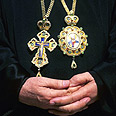
Christian clerics, Israel seek to ease difficulties
'Catholics not foreigners here - they are an integral part of life of the State of Israel,' cleric says of agreement that will settle outstanding taxation issues normalize Catholic presence in the country
JERUSALEM - Israel and the Catholic Church will soon sign an agreement that will regulate financial relations between them, according to senior Catholic officials in Jerusalem. Clerics say the long overdue agreement will settle outstanding taxation issues and will normalize the Catholic presence in Israel.
“The idea is to give a juridical frame and to say that Catholics are not foreigners here -- they are an integral part of the life of the State of Israel,” Father Pierbattista Pizzabella, the Custos (custodian) of the Holy Land responsible for the Christian holy sites, told a group of journalists including The Media Line. “Catholics must have a clear position according to the law and international agreements.”
Related stories:
- Christian cemetery in Jaffa desecrated
- Jewish, Christian leaders meet in Greece
- 5 die in Christian-Muslim clashes in Egypt
The Catholic Church also owns large amounts of property in Israel and there have been disputes over whether all of that property is tax-exempt.
“It is understood that a church, like a synagogue or mosque, does not pay taxes but it not clear what can be considered church property for the purpose of tax exemptions,” a senior Israeli diplomatic official told The Media Line. “For example, is a field exempted? Is a school exempted? Is a vineyard exempted?”
The Christian community in the Holy Land is somewhat anomalous. There are about 158,000 Christians living in Israel according to its Central Bureau of Statistics, 80% of who are Christian Arabs and the rest of whom are immigrants to Israel from the former Soviet Union or foreign workers.
“We’re having some difficulties in defining ourselves in the Holy Land,” Father Pietro Felet, of the Assembly of Catholic Ordinaries of the Holy Land, said. “We are not a national church but a mixture of Arab Christians, Hebrew-speaking Christians and Christians from the former Soviet Republic.”
Most of the churches cross national boundaries, representing Israel, the Palestinian territories, Jordan and even Cyprus.
“Normally, we have one state with many dioceses within one state, but here we have one diocese and many states,” Latin Patriarch Fouad Twal told The Media Line. “Our situation is not easy, it is complicated.”
'Land of revelation'
Like everything else in Israel, politics intervenes here as well. Bishop Mounib Younan, President of the Lutheran World Federation (LWF), who is the first Palestinian to head a world church, is quick to criticize Israel.
Identifying with criticisms of Israeli authorities frequently heard from Palestinians, he says Christians, too, resent the way they are treated by Israeli soldiers at checkpoints. Returning from Jordan recently, he was treated rudely by Israeli soldiers at the Allenby Bridge crossing.
“I understand that you need to search me, but why don’t you preserve my dignity,” he asked The Media Line. “This is not acceptable. It just leaves bitterness in the hearts of my people.”
In addition, he said, Israel has refused to issue family reunification permits if someone with Israeli citizenship marries a Palestinian who lives in the West Bank. He has raised this issue with Israeli authorities repeatedly, he says, without getting a response.
Several of the clerics said that finding housing and jobs for their flock is growing increasingly difficult. The employment rate for Christian Arabs in Israel is 48%, significantly less than for Jewish Israelis, according to the Central Bureau of Statistics.
“One of the problems for the Catholic Church in Jerusalem is land and housing,” Father Pizzabella said. “The rich people can afford homes here, but for the others it is almost impossible.”
He said the Catholic Church owns about 400 homes in Jerusalem’s Old City and wants to build projects in Nazareth and Jaffa, but has found fundraising more difficult due to the worldwide economic crisis.
There have also been hate crimes against Christians, including several “price tag” attacks, in which Jewish extremists have written anti-Christian and anti-Palestinian slogans on mosques. In some cases, ultra-Orthodox Jews spit when they pass Christian clerics in Jerusalem’s Old City.
“If you don’t denounce these issues when they happen they will continue,” Pizzabella warned.
While the numbers of Christians living in the Holy Land is small, the number of Christian visitors is large, and growing all the time. Of the 3.5 million visitors last year, more than half were Christians, and they pumped billions of dollars into the Israeli economy.
“We have a special location here -- this land, whether you like it or not is the land of revelation,” Father Pizzabella said. “The historical religious attachment to the land is very important.”
Article written by Linda Gradstein
Reprinted with permission from The Media Line
- Receive Ynetnews updates directly to your desktop










